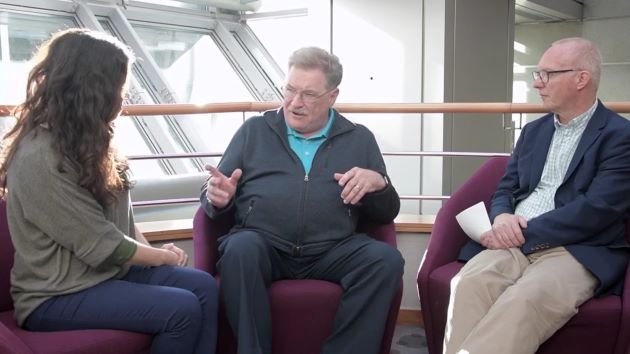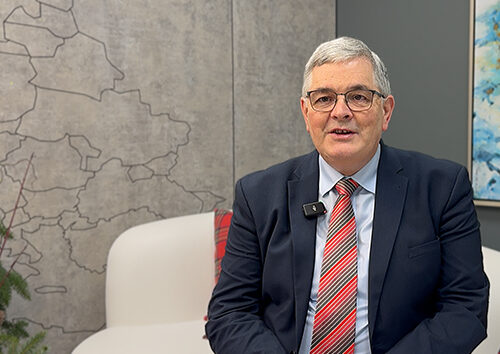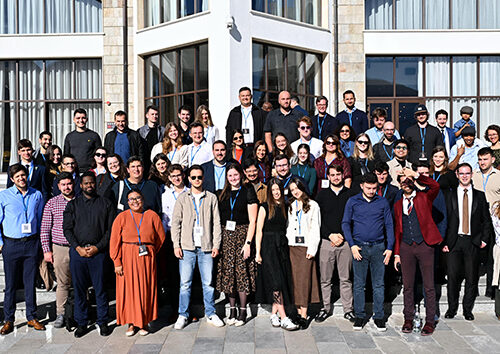26 October 2022 |Bucharest, Romania [Bill Knott, David Neal and Vanesa Pizzuto]
One of the outstanding keynote speakers at GAiN ’22 was Adventist Review Ministries Executive Editor, Bill Knott. During the busyness of the event, we managed to find a few moments of reflection – about Adventist Review and the GAiN Europe experience.
David Neal: As editor of Adventist Review and Executive Editor of Adventist Review Ministries, what have been the highlights?
Bill Knott:
It’s a long span to look back on! 25 years with the ministry, 16 in this role as Executive Editor. I would say the highlight for me has been the transformation, from historic journaling of the life of the Church, to a multi-media platform. The irony is that it happens to be someone who is deeply in love with books and paper who demanded that transition! I cannot be called a digital native or late comer, I’m just not there. But I watched God bring to the ministry, beginning around 2015, an amazing collection of deeply gifted people and I watched as they began to create products, move the needle, and expand what we were doing. It was as if the traditional role and rule of the Adventist Review suddenly became something much larger, more focussed on the diversity of the Church. All that happening, oddly enough, took place under the brain of a historian who love things that stay put. It’s been a dynamic time and required all of us (myself included), to embrace more risk and more change than we probably ever thought necessary. And that’s been for me the growth experience, to watch God reshape something we were all pretty happy with.
DN: So, the media has expanded, but the message has stayed the same.
BK: There are so many ways to convey the central truths of Adventism! When you start bringing creatives around you, they have thought of 8, 10, 12 ways to do things that never occurred to you. Learning how to say ‘yes’ to those ideas, instead of the reflexive mode that the Church often has about new methodologies… Those experiences have reminded me that God has never kept creativity away from his people. He gives it liberally! Our role at the Review, and more broadly in the Church, is to embrace that, to say ‘yes’ to that, to find ways to integrate those individuals in the life of our ministries.
DN: You have been a pastor to the Church through the printed page and the expanded media. Pastors have a vision and a dream for the Church. How would you like us to be, from where we are now?
BK: I’ve done a lot of thinking about that… In fact, we did a series in both journals – in Adventist Review and Adventist World for 15 months called “The Church I want to belong to”, in which we addressed important ideas about the Church, “The Church I want to belong to ‘is safe’.” What does ‘safety’ mean? Is that just physical safety? In many places it must be underlined. What does it mean to be emotionally safe in the church? What does it mean to be safe with divergent ideas? We had other topics, for example, “The Church I want to belong to is ‘prophetic’.” That isn’t only a focus on the ministry of Ellen White, it’s also about regaining our prophetic voice in the culture, speaking to issues of justice in the culture. I can’t really pick one of those many topics over and above the other; but overarching is a compelling belief that the Church I want to belong to has to commit itself to inclusiveness. It must study the ‘why’ and the ‘how’ of diversity. It has to say, ‘we must constantly be guarding against our tendencies to push others out, or restrict those who don’t see the world, or the Church, or Scripture exactly as we do’.
I get to see this process as I travel around. I see communities that embrace that kind of collaboration and inclusivity. Frankly, it is highly encouraging to me! One of the reasons I love coming to GAiN, is that I meet with a whole community of people for whom that is a kind of an unwritten motto, that’s the Church they want to belong to, and blessedly they’re in the process of creating that in the media.
Vanesa Pizzuto:
I heard you just say that you want to belong to an ‘inclusive church’, and I think many of us resonate with that. But, what would you say to young people who’ve been waiting for this to take place, and they feel not only are we not moving towards inclusiveness, but we are moving away?
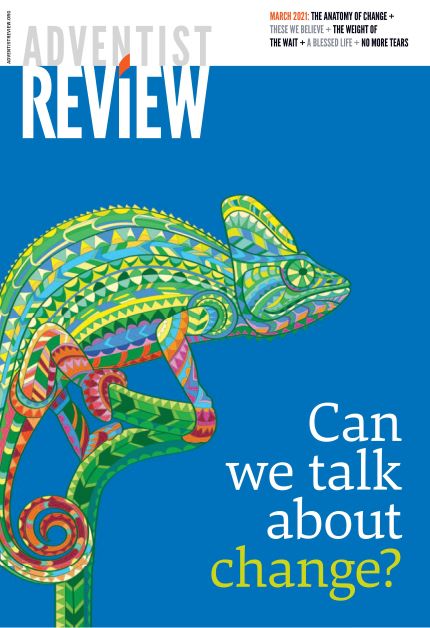
BK: There clearly has to be a time where we invite everyone in leadership to actually to get into conversation with youth and young adults. The danger for those who work in leadership is that it becomes something of an echo-chamber. You talk with 65-year-old peers, and you think you make sense of the Church. But if you have that same conversation with 20- and 25-year-olds – it won’t be the same conversation. And the challenge is that we stop listening to those voices. We define the Church as those who have similarly ‘mature’ viewpoints with us, and sound like us – that’s our vision of the Church.
I’m blessed to have two sons, both young adults active in the Church, who talk to me about their vision. I am blessed to know a lot of the young adults in the congregation I belong to and young pastors I have met around. I hear the frustration often. I’m aware, however, as you watch the wheels of administration turn, there is a commitment on the part of more and more leaders to do that kind of listening. I would always love it to go more rapidly! One of the key pieces is for the young adults themselves to not take the first ‘no’. We’re all tempted to say, “They didn’t want me, they said ‘no’ to my initiative.”
I have done a lot of coaching over the years with young adults who want to be engaged with Church leadership. One of the things I say to them is, “be persistent – persistence wins in this system. If you don’t go away, and you continue knocking on the door, you will be like the persistent widow of whom Jesus praised. You will find success! Because, if you stand in the doorway of a leader’s office, and you’re back there repeatedly, ultimately, you’ll get the invitation in. Your ideas will become part of the currency. I’ve watched this happen with many young adults. It never happens as rapidly as it should, but it is also not as challenging. Talk with your Conference leadership, talk with your Union, ask for appointments, get real time. Don’t wait for a glancing blow at a meeting, set up an appointment and talk with them. They will come to value you because they don’t know many other youth and young adults. And if you know how to talk with them, if you make it a safe conversation for them, you become their expert on young adults and so your ideas get heard. It’s a simple process of persistence.
DN: As you have mixed and mingled with the 180+ GAiN participants here in Bucharest, most of whom are European communicators, what is your impression?
BK: It’s like visiting one of those oxygen bars at the airport, those places where you can go and breath deeper oxygen.¹ I have that sense when I am around creative people. What I love about GAiN is that there is no perceptible competition going on. Oh, I’m sure everyone hopes to give a better presentation, but I love the fact that there is a built-in sense of collaboration… That non-competitive attitude, the sharing of creative people is to me the genius of GAiN. And frankly, the genius that I wish we could bring over into other parts of the ministry of the Church.
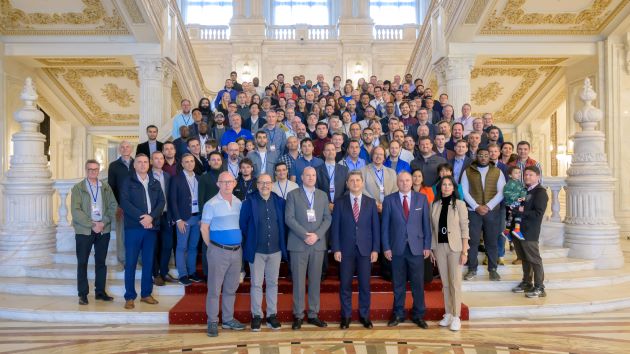
We tend to do a lot of promotion to each other. We show videos and PowerPoints of how well our department is doing, as a way of defending our territory. What I love here is that people talk candidly about the things that work, and that didn’t work. That’s real life – that’s the experience of creatives constantly innovating. The attitudes here, the warmth, the conviviality – does feel like enhanced oxygen. I have thoroughly enjoyed it.
VP: Bill, you have made ‘grace’ the signature sound of your ministry, the foundational stone, and I wonder why?
BK: Believe it or not, the Lord can still turn around the life of a 50-year-old Church leader – and He did. A dozen years ago, not too long after I became the editor of the Adventist Review, God led me through a profound renewal. It’s not the easiest role in which to have a renewal, because on one side you are out presenting and talking, and you’re going through this significant transformation at the same time. God pushed some people into my life who worked with me patiently and quietly, who helped me appreciate the Gospel more deeply that I had ever had. Out of that journey came this ministry now dubbed ‘Grace Notes’.² It began as Sabbath morning messages to six or seven friends, most of them pastors. Pretty soon there were hundreds and then thousands of subscribers – and currently there are hundreds of thousands receiving these messages. They are open source, and it doesn’t matter who gets the credit.
What I have discovered is that this Church is hungry for the message of grace. We have done well at wagging our finger at each other for a long time. We have done well at communicating our concern about a good solid lifestyle, but what we haven’t told people is that the Gospel is what empowers that change, and that the understanding of grace is actually more transformative than any amount of rule keeping we can do. So, for me, it’s been a personal experience. I describe to friends ‘Grace Notes’ as my weekly lab. I make myself wrestle with grace in my own life. I talk about things I’m experiencing, not in the first person – but those who know me can read a fair amount of autobiography. Inevitably, we tell out own story, and for me ‘Grace Notes’ is where I deal with grace in my life, in the life of the Church and in the life of the wider community. It has become for me that piece of joy that I never saw coming. God is using it in a way that frankly I never predicted, in places I will never get to.
VP: Thank you, Bill. It has been an honour to have you with us here at GAiN, and if you will allow us, we would love to pray with you before we go.
Dear Jesus, thank you for the ministry of Bill. Thank you for having deep thinkers, and for people who are wrestling with grace leading our Church. We pray that you bless him and that you give him more discernment, more love, more kindness, more compassion as he continues to guide us in a new ministry and new role. Thank you – because you always go before us, with You we have nothing to fear. In your name – Amen.
¹ It’s quite possible that the idea of an oxygen bar is new – as it was to DN! Here’s a brief introduction to what they are.
² Discover more about Grace Notes here.
[Photos: Tor Tjeransen, AME, CC BY 4.0 and James Botha]

